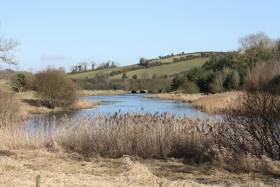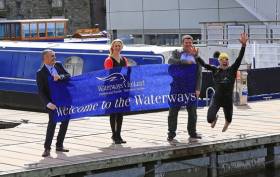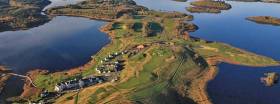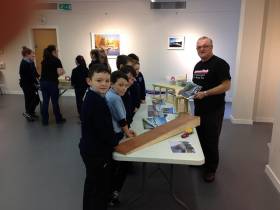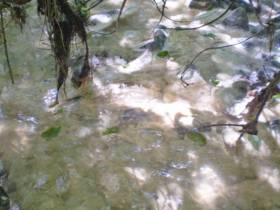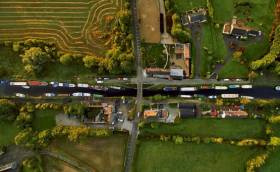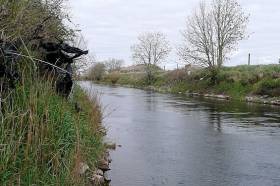Displaying items by tag: inland waters
#RiverTrusts - Killyleagh Community Centre in Co Down will host a workshop on 'The Role and Formation of River Trusts in Ireland' on Friday 1 July.
The objectives of this workshop are to bring together existing Irish river trusts and those planning on forming trusts to share experience and advice.
It's also intended to invite the various bodies involved with rivers in Ireland to meet with the participants and provide information and guidance on the roles that they see river trusts could play in protecting and enhancing our dense network of rivers and streams.
Full details of the workshop including times and booking information will be confirmed with the full programme at a later date.
Waterways Ireland Launches 2016 Events Programme
#InlandWaters - Waterways Ireland's 2016 event programme launches 120 events celebrating the arts, heritage, adventure, and sporting communities along Ireland's inland waterways.
Now in its tenth year, the programme has sponsored over 700 events with a knock-on effect of €80m in benefits to the local waterway communities. Information on all fun activities and events can be found on the Waterways Ireland website.
Events in the programme this year include TriAthlone on Lough Ree, TriAthy X in Athy on the Barrow, the Killaloe Water Festival on Lough Derg, the Erne Classic Fishing Festival, the Shannon Blueway Adventure Festival, the Docklands Summer Festival and Phizzfest in Dublin, and the Waterways Ireland Riverfest on the Lower Bann, which this year hosts the European Boat Wakeboard Championships.
"These events supported by Waterways Ireland have revitalised rural and small urban communities, and have facilitated the development of local community associations, leading to real economic and social impacts," says Sharon Lavin, head of marketing and communications at Waterways Ireland.
"The Waterways Ireland Sponsorship Programme in 2015 supported the participation of almost 38,000 people directly in waterway activity and welcomed over 160,000 spectators to waterway events along the navigations. The economic impact of the 2015 programme along is estimated at €7.8m."
The programme announcement comes after Waterways Ireland announced its 2016 boating season, which kicked off earlier this month.
In other news, over 90 local businesses attended the 'Build Your Blueway' Networking Expo recently at The Bush Hotel in Carrick-on-Shannon, creating and developing new business opportunities across Cavan, Roscommon, Longford and Leitrim.
Organised by the Upper Shannon Erne Future Economy Project in conjunction with Waterways Ireland, the event offered activity, arts, heritage and cultural businesses the opportunity to present their business, network and develop cross-selling options with accommodation providers and others in a series of sessions.
Lough Erne Loses 2017 Irish Open
#LoughErne - It's been confirmed that the Lough Erne Resort will no longer host next year's Irish Open golf tournament.
As reported on Afloat.ie earlier this year, changes in the European golfing scene had cast doubt on the Fermanagh lakeland resort hosting of the 2017 event in after getting the nod two years ago before its purchase by American business tycoon Tony Saliba.
Those doubts were confirmed last week, as the News Letter reports, with a statement from the Lough Erne Resort that it is "extremely disappointed" that the European Tour has announced a change in venue.
It's understood that the sport's new European bosses favour a links course for the annual Irish Open, with Portstewart Golf Club on the North Coast a likely candidate.
The News Letter has more on the story HERE.
School Children Float & Boat For Engineers Week
#InlandWaters - Waterways Ireland has hosted a series of successful site visits and workshops for primary pupils to visit the Barrow Navigation and the Erne System as part of Engineers Week 2016.
Now in its 10th year, Engineers Week is a programme of nationwide events with the aim of celebrating the world of engineering in Ireland.
The theme for 2016 was 'Engineering Our Future' – aimed at igniting the imaginations of the next generation of engineers.
More than 50 pupils from St Johns NS, Monasterevin and Kildangan NS came to the Barrow in Monasterevin to meet the Waterways Ireland engineering staff who brought them on a tour around the operation of the lifting bridge, the aqueduct and the lock.
Meanwhile, over 75 students from Brookeborough PS, Jones Memorial PS and Ederney PS visited Waterways Ireland headquarters in Enniskillen where engineers led them through a series of workshops including bridge building, making floating and fixed jetties, marshmallow challenges and the Archimedes Screw.
According to Waterways Ireland, feedback from schools has been very positive with many expressing interest in attending future educational events – and a number of children stating that they want to become engineers in the future.
Engineers Week highlights the range of work undertaken by the engineering staff of Waterways Ireland, which employs civil and mechanical engineers and technicians on a range of projects on all seven navigations managed by the organisation.
Projects include navigation operation, maintenance and development, structural design, project management, fleet management, development and maintenance of electro-hydraulically operated lock gates and accompanying smart card system, and many more.
Waterways Ireland has brought over 1,500 pupils to the waterways principally for Engineers Week over the last three years of the programme.
Kerry Pig Farmers Convicted Over River Pollution
#Pollution - A Kerry-based pig farming company has been convicted in relation to a river pollution incident last summer arising from its premises in Castleisland.
Pollution of a River Maine tributary stream had been noted by Inland Fisheries Ireland (IFI) staff on 10 June 2015. Extensive sewage fungus growth and water discolouration were observed over 2km of channel length, downstream of a contaminated surface drain discharging from the defendant’s farm premises.
Michael McAuliffe Ltd pleaded guilty to two charges, a breach of Section 3(2) of the Local Government (Water Pollution) Act 1977 and Section 171(1) of the Fisheries (Consolidation) Act 1959.
At a sitting of Tralee District Court on 24 February, Judge James O’Connor found the defendant company guilty of both charges, imposing a fine of €500 on the first charge and marking the conviction on the second charge as “taken into consideration”.
Costs and expenses were awarded to IFI to the sum of €2,603 with the defendant company given seven months to pay.
Commenting on the case, IFI chief executive Dr Ciaran Byrne said: “Protection of fish stocks is vital to maintaining an extremely valuable natural resource for the benefit of local and tourist anglers alike.
"Recreational angling in Ireland is worth over €836 million to the economy and supports over 11,000 jobs. Salmon and sea trout, in particular, depend on good water quality to survive, and IFI is committed to protecting water quality in our rivers and lakes.”
IFI has a confidential hotline number to enable members of the general public to report incidents at 1890 34 74 24 or 1890 FISH 24. This phone line is designed to encourage the reporting of incidents of illegal fishing, water pollution and invasive species. For more information visit www.fisheriesireland.ie
Waterways Ireland Launches Heritage Grants Programme
#InlandWaters - Waterways Ireland have announced a Heritage Grants programme in support of its Heritage Plan 2016-2020.
A total of €20,000 has been allocated to help further community-based heritage projects on inland waterways and navigations under the auspices of Waterways Ireland.
Projects must compliment or fulfil the delivery of the Waterways Ireland Heritage Plan, which is available to download HERE.
Application forms with detailed guidelines and eligibility criteria are available in PDF and Microsoft Word formats.
As this is the first year of the grant, contact Cormac McCarthy for any assistance at [email protected] or 061 922 149 or 087 278 7463. The deadline for receipt of applications is Friday 22 April.
Claregalway Man Convicted Of Poaching Offences
#Poaching - A Claregalway man was convicted of an illegal fishing offence at a sitting of Galway District Court recently.
Niall O’Gorman, with an address at Kiltrogue, Claregalway, was found guilty on 2 February of possession of a net and obstruction of fishery officers at Kiltrogue on the Clare River on 27 May 2015.
Fines of €500 were issued on each charge, totalling €1,000, and costs were awarded to Inland Fisheries Ireland to the amount of €600.
Judge Mary Fahy heard evidence that fishery officers on patrol in the early hours of 27 May observed the defendant in a kayak, servicing and cleaning a net, before placing it in a bag. He then proceeded to a second net, fixed in the river, where the officers approached him.
O’Gorman made an attempt to flee in the kayak, necessitating one of the fishery officers entering the water to apprehend him.
The solicitor for the defendant asked for leniency, stating that her client had made a stupid mistake, that he was of limited means and that he accepted the serious nature of the offence.
Judge Fahy said that the defendant was obviously not a teenager and had acted in a very immature way. She commented further that she had heard a number of fishery cases recently and that this was the most serious, necessitating an officer to enter the water in the early hours of the morning.
The nets were forfeited, although the kayak was returned to O’Gorman, who gave an undertaking in court not to use the kayak for anything other than kayaking in the future.
Commenting on the case, John Conneely of Inland Fisheries Ireland commended the fisheries officers involved. He said: “Protection of fish stocks is vital to maintaining an extremely valuable natural resource for the benefit of local and tourist anglers. Recreational angling in Ireland is worth over €836 million to the economy and supports over 11,000 jobs.
"IFI staff are committed to protecting that resource, working in difficult conditions and bad weather to do so, and their vigilance and dedication is highly valued.”
Dr Ciaran Byrne, CEO of Inland Fisheries Ireland, said: “The Clare River has unfortunately been the victim of environmental crime once again. This activity must be stopped to ensure that the important recreational amenity and its biodiversity are conserved for future generations.”
Inland Navigations Historical Society To Host Conference
#InlandWaters - The Inland Navigations of Ireland Historical Society is holding a one-day conference on the Mid-Shannon next Saturday 12 March in Hugh Lynch's Function Room, Tullamore.
The conference is in partnership with the Inland Waterways Association of Ireland, the Irish Boat Rental Association, the Heritage Boat Association and Waterways Ireland.
There will be a variety of speakers on the day, and refreshments will be provided. For further details see the information pack HERE.
Lough Erne's Hosting Of Irish Open No Longer Certain
#LoughErne - Changes in the European golfing scene have cast doubt on Lough Erne's hosting of the Irish Open in 2017.
The Faldo Championship Course on the lough's shores was given the nod in early 2014 to host Ireland's most prestigious golf event, which was held at Royal County Down last summer.
Since then the Lough Erne Resort was snapped up by American business tycoon Tony Saliba.
But now the News Letter reports that European Tour officials have backed away from a firm commitment after the emergence of new stakeholders in Rory McIlroy's Rory Foundation and sponsor Dubai Duty Free – and a changing of the guard at the executive level.
According to a European Tour spokesperson, new CEO Keith Pelly "has big, big ideas about what he wants to do and the Irish Open is a key part of that strategy because it is one of the biggest tournaments.”
The News Letter has more on the story HERE.
Inland Fisheries Ireland Issues Statement On Response To Flooding Crisis
#Flooding - Inland Fisheries Ireland has issued a statement in response to the ongoing flooding crisis across the country following last month's winter storms.
Citing its history of working "in a positive and proactive manner" with the Government, State agencies, local authorities and others on the drainage and management of surface waters, IFI says it "will work with all relevant parties in expediting emergency flood relief works."
Following the recent meeting on the Shannon flooding crisis, IFI says it has offered emergency assistance on the ground, and suggested that the Local Authority (Works) Act 1949 be used as a legal instrument by which "exemptions for emergency in stream works could be progressed".
According to IFI chief executive Dr Ciaran Byrne: “Fisheries legislation provides for a closed season for undertaking instream works. However, in emergency circumstances, such as those currently being experienced, the 1949 Act provides for the relevant minister to issue an exemption subject to taking precautions and making provisions for the protection of fisheries.”
Cork County Council has already requested exemption from the closed season for instream works from now through to the end of 2017, though IFI says that falls beyond the scope of the Act, which only provides for emergency works.
Regardless, IFI maintains that it will continue to work with Cork County Council on the removal of excess gravel from the Bandon River downstream of Bandon's old road bridge "to allay fears that these gravels may cause flooding".
IFI's statement adds that it looks forward to the successful implementation of the upcoming OPW Bandon Main Drainage Scheme.
Scheduled to begin in June this year, the works will see the rock bed of the river lowered by up to 2m in the heart of the town, tapering downstream for up to 3.5km.
This scheme was agreed several years ago and was prepared by the OPW following consultation and consultative reports. It includes provision for a fisheries habitat rehabilitation programme once the design bed levels and flood conveyance capacity are achieved.



























